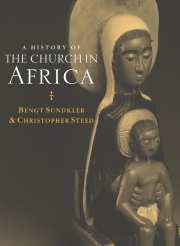Book contents
- Frontmatter
- Contents
- List of maps
- Acknowledgements
- List of abbreviations
- Introduction
- PART I THE FIRST FOURTEEN HUNDRED YEARS
- PART II THE MIDDLE AGES 1415 – 1787
- PART III THE LONG NINETEENTH CENTURY 1787 – 1919
- PART IV THE COLONIAL EXPERIENCE 1920 – 1959
- 11 Continental Panoramas
- 12 Local Perspectives
- 13 North and North-Eastern Africa
- 14 West Africa
- 15 Central Africa
- 16 Southern Africa
- 17 Eastern Africa
- PART V INDEPENDENT AFRICA 1960 – 92
- Notes
- Bibliography
- Name index
- Subject index
13 - North and North-Eastern Africa
from PART IV - THE COLONIAL EXPERIENCE 1920 – 1959
Published online by Cambridge University Press: 16 September 2009
- Frontmatter
- Contents
- List of maps
- Acknowledgements
- List of abbreviations
- Introduction
- PART I THE FIRST FOURTEEN HUNDRED YEARS
- PART II THE MIDDLE AGES 1415 – 1787
- PART III THE LONG NINETEENTH CENTURY 1787 – 1919
- PART IV THE COLONIAL EXPERIENCE 1920 – 1959
- 11 Continental Panoramas
- 12 Local Perspectives
- 13 North and North-Eastern Africa
- 14 West Africa
- 15 Central Africa
- 16 Southern Africa
- 17 Eastern Africa
- PART V INDEPENDENT AFRICA 1960 – 92
- Notes
- Bibliography
- Name index
- Subject index
Summary
THE MAGHREB
Black Africa's struggle for Independence did, in the main and with certain tragic exceptions, avoid violence and bloodshed. Algeria, on the other hand, had a long and terrible war, 1954–62. When this came to an end with an ‘Algerian Algeria’, this historical change was due to the leadership of an extraordinary personality, with extraordinary courage and extraordinary determination, Charles de Gaulle. About 800,000 French men and women left Algeria, returning to France, leaving behind some 200,000 Europeans, a figure soon to be reduced to about 25,000.
Since the beginning of the century the Church had obviously been a foreign body consisting almost totally of foreigners. The contacts between an Algerian-dominated majority and a French dominating minority were very much limited. What there was of contacts between the two religious communities could be experienced in the countryside rather than in the cities: only in the countryside, the Cardinal said, one saw those ‘simple, easy and human contacts’. The Catholic Sisters – Charles de Foucauld's Little Sisters of Jesus – devoted almost all of their time to Muslim families. In the Catholic schools Muslim and Catholic children were taught together: ‘A school open only to Christians would not be a Catholic school’, the Cardinal declared.
Appointed to the diocese of Constantine in 1947 – Archbishop in 1954 and Cardinal in 1965 – Léon-Etienne Duval concentrated on problems of poverty and unemployment and the insecurity of life for the proletariat.
- Type
- Chapter
- Information
- A History of the Church in Africa , pp. 686 - 699Publisher: Cambridge University PressPrint publication year: 2000



